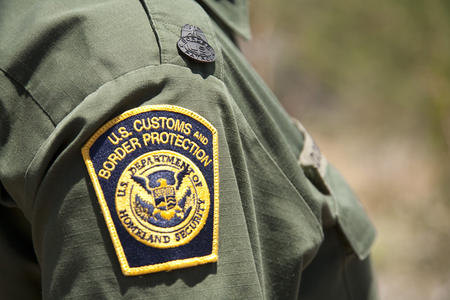"Well, I pepper spray them in the face, of course, drag them to the ground, kick them, and handcuff them” The U.S. Border Patrol agent laughed and waited a beat before giving a more vague, but less horrifying answer to my question regarding what an apprehension at the border looks like.
His answers to my other questions began the same way—a sarcastic remark before, or instead of, a serious response. I asked him if, in his opinion, as a veteran agent, there was truly a need for more Border Patrol agents at the U.S.-Mexico border. 
“Do the Yankees want more hitters?” he said. Again, he laughed, as though my question were preposterous.
I asked my last question, sure that I would elicit something genuine: “Why did you become a Border Patrol agent?” “Because I wanted to hold a gun,” he asserted.
I was talking with a member of the Border Patrol’s Public Affairs Office in front of a stretch of the U.S.-Mexico border wall near El Paso, Texas. The 18 members of my group had formed a semi-circle around him and his fellow agent who had come to speak to the Border Servant Corps, an organization I had recently joined. We were there as part of our orientation to the region.
I’d visited the border wall previously, over a year ago, in Arizona. Like the last time, the barrier struck me first as bizarre—a towering construction blocking one arbitrary piece of land from another.
This time, the wall seemed all the more strange when a young boy and his little sister on the Mexican side began a conversation with some of the members of my group before our speakers arrived. When the Border Patrol’s green striped van pulled up and our meeting began, the children in a separate country, kept from us by a big ugly fence, made for an eerie backdrop.
I have strong feelings and beliefs with regard to the work of the Border Patrol, but I was thoroughly shocked by the casual and offensive nature of the Public Affairs agent’s remarks. I had wanted a genuine conversation, but I understand better now that the conversation of my dreams is never going to be a reality.
Encapsulated in this agent’s flippant answers is effectively the Border Patrol’s institutional attitude of disregard. I want to bring to the table topics like human and civil rights, appropriate government spending, and, in my most hopeful fantasies, the ideologies behind the existence and maintenance of borders. But the Border Patrol—and the political apparatus of which it is part--won’t have that kind of discussion.
As much as I’d like to believe that the agent as one bad apple (like the singular bad apples that abuse migrants in detention centers, and shoot at boys throwing rocks), he’s a spokesperson for the cruelty and ignorance of a large and powerful federal agency. He didn’t have one thoughtful or gentle comment to make about these undeniably complex emotional realities of the border.
I heard this same self-exculpating, emotionless script from his fellow agent—the regurgitated reminder of their role as “law enforcers, not law makers!”—and the delicate racist notes in her story of growing up in El Paso, and having her bike stolen repeatedly by Mexicans looking to make a profit in their home country. These are not comments made by representatives of an agency that has a stake in family reunification or a long-term memory that might give historical perspective to immigration issues.
Almost a month after this encounter, I think about the male agent’s words almost every day—when I’m giving Know Your Rights presentations to groups in Las Cruces, New Mexico; when I’m talking with my housemate who works in a domestic violence shelter; when I’m listening to community groups rallying support around immigration reform. I remind myself that the agent is the part of the system we are working against—a laughing, uniformed, one whose arrogance is wreaking havoc.
Caroline Iosso works for the ACLU of New Mexico Regional Center for Border Rights in Las Cruces.

